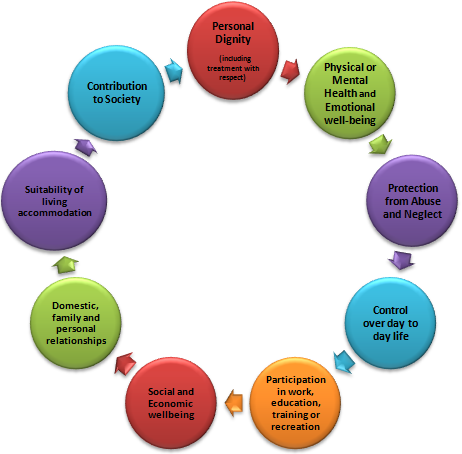Promoting Individual Wellbeing
The promotion of Wellbeing (also known as the Wellbeing Principle) is one of the principle duties of the Care Act 2014. When carrying out care and support functions, every action taken, or decision made about a person by the Local Authority both corporately and operationally must give demonstrable regard to the impact upon the person's Wellbeing.
The duty to promote individual Wellbeing is section 1 of the Care Act. Whenever a document or person refers to section 1 of the Care Act they are referring to the duty to promote individual Wellbeing, even if they do not specifically use that phrase.
The Wellbeing Principle applies in all cases where the Local Authority is carrying out a care and support function. It applies equally to all people, regardless of whether they have been assessed as having eligible needs, regardless of their mental capacity and regardless of their ability or willingness to engage in processes of Adult Care and Support.
The promotion of Individual Wellbeing is described in the Care Act as 'actively seeking improvements in the various aspects of Wellbeing when carrying out any Care and Support function'. This can relate to any stage of the Care and Support process, from the provision of information and advice to reviewing a care and support plan or safeguarding.
Everybody's perception of Wellbeing is different because the meaning and sense of Wellbeing is a personal thing to each individual. As such there is no single definition in the Act. However, it encompasses the following non-hierarchical areas in particular;

Non-hierarchical means that no one area of Wellbeing is seen in law as being more or less important than another area. All should be considered as of equal importance when considering Wellbeing in the round. However, practitioners will need to take account of the fact that some areas will be more important to the individual than others.
Although not expressly included in the way that Wellbeing is defined in the Care Act, the statutory guidance states that independent living is a core part of the Wellbeing Principle. Supporting people to live as independently as possible for as long as possible is an important element of promoting Wellbeing.
When considering individual Wellbeing the Local Authority should:
- Not make assumptions that because two people may have similar Care and Support needs they will also have similar needs in relation to the promotion of their Wellbeing;
- Support practitioners to have genuine conversations with people to identify and explicitly consider the most relevant aspects of their Wellbeing, assess how their needs impact on them and understand the goals and outcomes they wants to achieve;
- Consider with the person how to meet their specific needs-attempts should not be made to simply 'fit' people into existing Care and Support services regardless of whether these services will promote their Wellbeing. People should be supported to think about how to remain as independent as possible for as long as possible, and within this how to utilise their own strengths and the strengths of their informal networks and communities;
- Recognise that modern Care and Support can be provided in any number of ways, with new models emerging all the time, rather than defaulting to the traditional models of residential and domiciliary care.
Furthermore, when giving regard to the impact that a particular action, function or decision will have on a person's Wellbeing the Local Authority must:
- Begin with the assumption that the person is best-placed to judge their own Wellbeing;
- Establish, take into account and respect the person's views, wishes, feelings and beliefs (including those expressed historically by a person who may now lack capacity);
- Place importance on the prevention or delay of the need for formal or informal Care and Support, and the reduction of needs that already exist;
- Ensure that decisions about the person are made holistically, having regard to all of the person's circumstances (not having been clouded by unjustified assumptions about one or more elements of the person's medical condition, lifestyle, behaviour or characteristics e.g. age, appearance or beliefs);
- Support the person to participate as fully as possible, including the provision of information and support necessary to enable them to engage (there is a duty under the Act to provide independent advocacy where a person lacks capacity or has substantial difficulty in engaging in or understanding Adult Care and Support processes and does not have anyone to speak for them);
- Achieve a balance between the person's Wellbeing and that of any friends or relatives who are involved in caring for them; people should be supported in the context of their family and support networks;
- Protect people from abuse and neglect;
- Ensure that any restriction on the person's rights or freedom of action is kept to the minimum necessary.
A person's sense of Wellbeing is often not related at all to any eligible needs they may or may not have and as such conversations about wellbeing should not be guided by conversations about eligible needs. Instead, Wellbeing relates to the things that the person sees as their priorities in life at the moment in time that they are asked. If a person feels they have no issues in a particular wellbeing domain this does not mean that area is not important to them-just that they currently have no worries about it.
A person's sense of Wellbeing changes over time and depending on the catalyst this change can be quite dramatic. Dramatic shifts in wellbeing can have a big impact on all areas of a person's life. Therefore the Local Authority must make sure that it takes opportunities at each contact to establish changes early and respond to them in order to prevent, delay or reduce the impact on potential needs for Care and Support.
Last Updated: February 12, 2024
v9